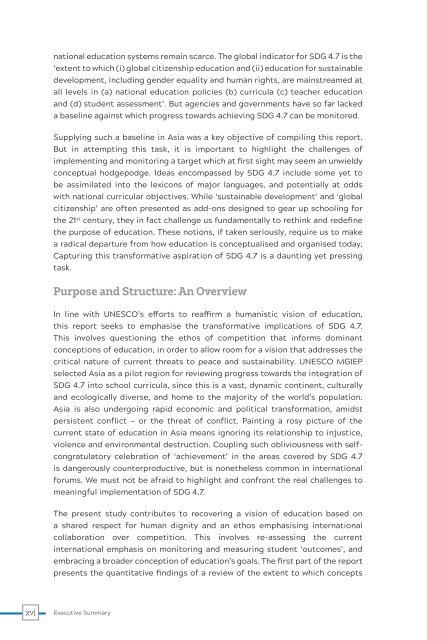Rethinking Schooling for the 21st Century
UNESCO MGIEP officially launched 'Rethinking Schooling for the 21st Century: The State of Education, Peace and Sustainable Development and Global Citizenship' in 2017 at the UNESCO General Conference. This study analyses how far the ideals of SDG 4.7 are embodied in policies and curricula across 22 Asian countries and establishes benchmarks against which future progress can be assessed. It also argues forcefully that we must redefine the purposes of schooling, addressing the fundamental challenges to efforts to promote peace, sustainability and global citizenship through education.
UNESCO MGIEP officially launched 'Rethinking Schooling for the 21st Century: The State of Education, Peace and Sustainable Development and Global Citizenship' in 2017 at the UNESCO General Conference. This study analyses how far the ideals of SDG 4.7 are embodied in policies and curricula across 22 Asian countries and establishes benchmarks against which future progress can be assessed. It also argues forcefully that we must redefine the purposes of schooling, addressing the fundamental challenges to efforts to promote peace, sustainability and global citizenship through education.
You also want an ePaper? Increase the reach of your titles
YUMPU automatically turns print PDFs into web optimized ePapers that Google loves.
national education systems remain scarce. The global indicator <strong>for</strong> SDG 4.7 is <strong>the</strong><br />
‘extent to which (i) global citizenship education and (ii) education <strong>for</strong> sustainable<br />
development, including gender equality and human rights, are mainstreamed at<br />
all levels in (a) national education policies (b) curricula (c) teacher education<br />
and (d) student assessment’. But agencies and governments have so far lacked<br />
a baseline against which progress towards achieving SDG 4.7 can be monitored.<br />
Supplying such a baseline in Asia was a key objective of compiling this report.<br />
But in attempting this task, it is important to highlight <strong>the</strong> challenges of<br />
implementing and monitoring a target which at first sight may seem an unwieldy<br />
conceptual hodgepodge. Ideas encompassed by SDG 4.7 include some yet to<br />
be assimilated into <strong>the</strong> lexicons of major languages, and potentially at odds<br />
with national curricular objectives. While ‘sustainable development’ and ‘global<br />
citizenship’ are often presented as add-ons designed to gear up schooling <strong>for</strong><br />
<strong>the</strong> 21 st century, <strong>the</strong>y in fact challenge us fundamentally to rethink and redefine<br />
<strong>the</strong> purpose of education. These notions, if taken seriously, require us to make<br />
a radical departure from how education is conceptualised and organised today.<br />
Capturing this trans<strong>for</strong>mative aspiration of SDG 4.7 is a daunting yet pressing<br />
task.<br />
Purpose and Structure: An Overview<br />
In line with UNESCO’s ef<strong>for</strong>ts to reaffirm a humanistic vision of education,<br />
this report seeks to emphasise <strong>the</strong> trans<strong>for</strong>mative implications of SDG 4.7.<br />
This involves questioning <strong>the</strong> ethos of competition that in<strong>for</strong>ms dominant<br />
conceptions of education, in order to allow room <strong>for</strong> a vision that addresses <strong>the</strong><br />
critical nature of current threats to peace and sustainability. UNESCO MGIEP<br />
selected Asia as a pilot region <strong>for</strong> reviewing progress towards <strong>the</strong> integration of<br />
SDG 4.7 into school curricula, since this is a vast, dynamic continent, culturally<br />
and ecologically diverse, and home to <strong>the</strong> majority of <strong>the</strong> world’s population.<br />
Asia is also undergoing rapid economic and political trans<strong>for</strong>mation, amidst<br />
persistent conflict — or <strong>the</strong> threat of conflict. Painting a rosy picture of <strong>the</strong><br />
current state of education in Asia means ignoring its relationship to injustice,<br />
violence and environmental destruction. Coupling such obliviousness with selfcongratulatory<br />
celebration of ‘achievement’ in <strong>the</strong> areas covered by SDG 4.7<br />
is dangerously counterproductive, but is none<strong>the</strong>less common in international<br />
<strong>for</strong>ums. We must not be afraid to highlight and confront <strong>the</strong> real challenges to<br />
meaningful implementation of SDG 4.7.<br />
The present study contributes to recovering a vision of education based on<br />
a shared respect <strong>for</strong> human dignity and an ethos emphasising international<br />
collaboration over competition. This involves re-assessing <strong>the</strong> current<br />
international emphasis on monitoring and measuring student ‘outcomes’, and<br />
embracing a broader conception of education’s goals. The first part of <strong>the</strong> report<br />
presents <strong>the</strong> quantitative findings of a review of <strong>the</strong> extent to which concepts<br />
xvi<br />
Executive Summary

















